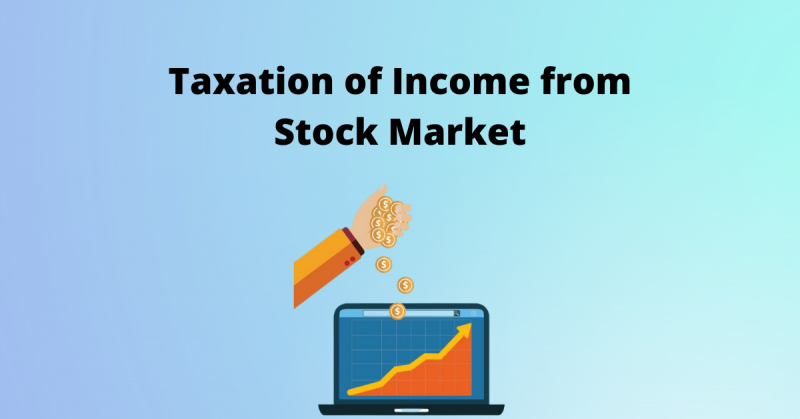Taxation of Income from Stock Market
With people’s growing interest and knowledge in the field of investment, trading in stock markets has grown significantly in recent years; as a result, it’s become critical to understand how various stock market profits are taxed under the Income Tax Act of 1961.
Various stock market earnings and their tax implications
- Intraday share trading
Intraday trading is defined as a trader buying and selling stocks on the same trading day in order to profit from price fluctuations throughout the day. In operations like purchasing and selling stocks from the same trading account on the same day, there is no actual delivery. Such transactions are regarded as speculative transactions under “The Income Tax Act, 1961,” hereinafter referred to as “The Act,” because a speculative transaction is defined as “a transaction in which a contract for the purchase or sale of any commodity is resolved other than by the actual delivery/transfer of the commodity,” as defined by section 43(5) of the Act; income from intraday trading is taxable under the head “Income From Business and Profession,” and the tax is calculated at a rate Only earnings from speculation business can be used to offset unabsorbed speculative business loss. It can only be carried forward for four assessment years for set-off against the following year’s income from speculating company. - Income from delivery based share trading:
Depending on different circumstances such as the form and frequency of transactions, the holding duration of shares, and the assessee’s preference, income from delivery-based transactions might be classified as “Income from business and profession” or “Income from capital gain.”- If the income is in the form of a capital gain and the transaction is completed on a recognised stock exchange, then:
- Long-term capital gains are exempt up to Rs. 1 lakh, after which amounts above Rs. 1 lakh are taxable at 10% under section 112A.
- Section 111A of the Internal Revenue Code makes short-term capital gains taxable at 15%.
- If the income is derived from a business, the entire amount is taxable according to the applicable tax slab.Individuals and HUFs will be required to undergo a tax audit if they:
- The annual revenue exceeds Rs. 10 crores.
- If presumptive taxation is chosen and the income available for taxation is less than 8% of turnover, or if a loss occurs.If the income is derived from a business, the entire amount is taxable according to the applicable tax slab.
- If the income is in the form of a capital gain and the transaction is completed on a recognised stock exchange, then:
Futures and options (derivative) transactions generate income
A derivative is a financial instrument that has no intrinsic value. Its value is derived from the underlying asset’s value. If a transaction in derivatives is done through a recognised stock exchange, STT is paid, and a contract note supports the transaction, it is specifically excluded from the “Speculative transaction” category. Profits and losses from such transactions will be treated as regular business income and loss, and would be taxed at the slab rate.
When it comes to stock market earnings, it’s critical to keep track of the nature of transactions so that taxes may be calculated appropriately and under the relevant heading.

